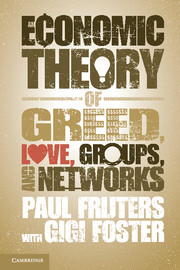Book contents
- Frontmatter
- Contents
- List of figures
- Preface
- Acknowledgments
- Introduction and preview
- PART I Greed and love
- 1 Individual materialism, organizations, and power: The view from mainstream economics
- 2 Love: The missing building block
- PART II Groups, power, and the development of institutions
- PART III Implications and examples
- References
- Index
2 - Love: The missing building block
Published online by Cambridge University Press: 05 May 2013
- Frontmatter
- Contents
- List of figures
- Preface
- Acknowledgments
- Introduction and preview
- PART I Greed and love
- 1 Individual materialism, organizations, and power: The view from mainstream economics
- 2 Love: The missing building block
- PART II Groups, power, and the development of institutions
- PART III Implications and examples
- References
- Index
Summary
Selfish materialism is extremely powerful in explaining many of our laws, our customs, our politics, and our choices as consumers. Yet, as discussed briefly in the previous chapter, selfish materialism alone cannot lead to the kind of human organizations we see in reality. Love is an additional core motivation that I wish to define, dissect, and finally incorporate into the economic view of human nature, our organizations, and our societies more broadly.
Loving something or someone is defined, in this book, as caring about that thing or person regardless of any observable reward. One loves if one is willing to sacrifice oneself for someone or something, even if no one is aware of that sacrifice and even if there is no tangible reward. This willingness comes about because loving actions invariably bring a sense of internal warmth to the individual who loves. The mechanism I propose that creates this sense of internal warmth is that someone who loves has effectively redefined the other as part of himself, and therefore feels rewarded when the object of his love is nurtured, as if he himself is being nurtured.
By this definition, one truly loves one's children if one feeds them, clothes them, hugs them, educates them, and invests in them, even if one detests all of these activities and even if the children never give anything back. You truly love another person and are therefore altruistic towards him when you willingly go out of your way to ensure that he is happy, even if he does not love or even know you. Similarly, you truly love a god when you revere and worship that god, even if that god never smiles upon you or acknowledges you.
- Type
- Chapter
- Information
- An Economic Theory of Greed, Love, Groups, and Networks , pp. 74 - 142Publisher: Cambridge University PressPrint publication year: 2013



